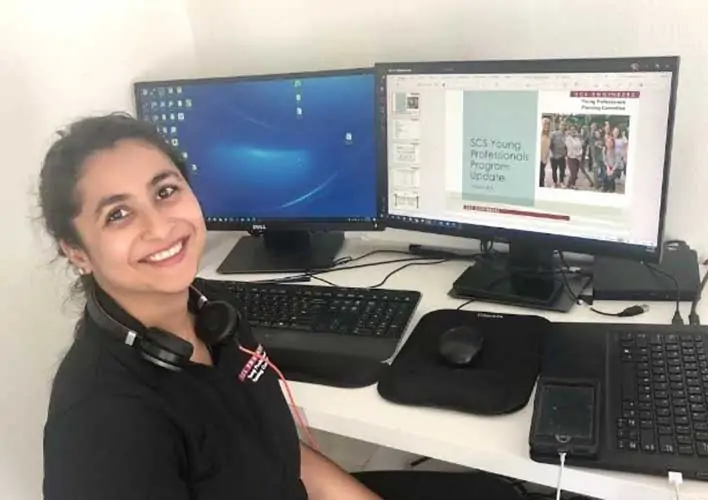


What is your title and responsibilities at SCS Engineers?
My title at SCS Engineers is “Project Professional.” In the Southeast region, we have something called “Assistant Project Managers,” which is not an official title. However, as the name suggests, the position entails helping the project manager run the project. My responsibilities include:
What attracted you to join SCS?

What attracted me initially to SCS was working in Environmental Services. I have been with SCS for over three years now and have expanded into sustainable materials management (SMM), which is interesting and good for communities and the environment. I’m also eager to build a more comprehensive knowledge of using what was once waste to renewable energy sources and clean-burning fuel. Solid waste management and landfills are fascinating, more than I ever imagined. SMM, renewable energy, remediation, and landfill operations are interconnected and essential for keeping people and communities safe and thriving.
What is your favorite part of working at SCS?
The people at SCS! We hire humble, hungry, and smart people. The knowledge pool is incredible, and everyone is always willing to help, no matter what part of the country you’re working. People are just a phone call away.
What do you feel is your greatest achievement or contribution to date?
I am working on a 500-acre landfill redevelopment project divided into four quadrants. Our client completed construction on one quadrant with nine buildings. We’ve received closure for eight of the nine buildings and anticipate closure for the remaining building soon. I take pride in supporting them to accomplish the closure and earn the environmental approvals safer and faster because of my combined team’s expertise and experience.
What is challenging for you as a YP?
Learning to manage my time was the greatest challenge. Regularly, I would stay late to work on projects and completing my tasks. It wasn’t a sustainable balance in my life. I said yes to everything assigned instead of letting the project manager know that my plate was full. Now, by planning my day better, prioritizing, and giving project managers realistic deadlines. I found the balance that works, and I am more productive.
What has helped with your success?
The support of management and our team at SCS has made me successful. If I have an issue with a project or unsure of the direction I need to take, I know I can rely on my team to help. There have been times when colleagues have dropped what they are doing to help me finish a project on time and within budget.
Do you have a favorite aspect of SCS’s Young Professionals Program, and describe your role as Chair?
My favorite aspect of the YP program is the mentorship program that the committee relaunched in 2020. It is such an incredible opportunity as a YP to be guided by an experienced professional. They have stood where we are today, and getting to learn from their experience is invaluable; our YPs take advantage of it.
I enjoy my role as the Chair of the YP program; I spend my energies organizing by:
What are your favorite hobbies outside of SCS?
I am a bit of a nerd, so my friends and I play Dungeons and Dragons every week. I also like DIY projects with arts and crafts – I made wall décor out of cardboard when I moved into my house!
What advice do you have for others getting into STEM fields?
When I was younger, I was advised not to go into the science, technology, engineering, and mathematics fields by my career advisors and teachers because they did not think I would be successful. In fact, because of their advice, I tried out classes in the non-STEM field like history, commerce, geography, and I did not enjoy them. I was still intrigued by the STEM field, so I listened to my gut and look where I am today! STEM is not biased. My advice would be not to let anyone tell you that STEM is not for you. If you want to study science, technology, engineering, and mathematics, just do it!